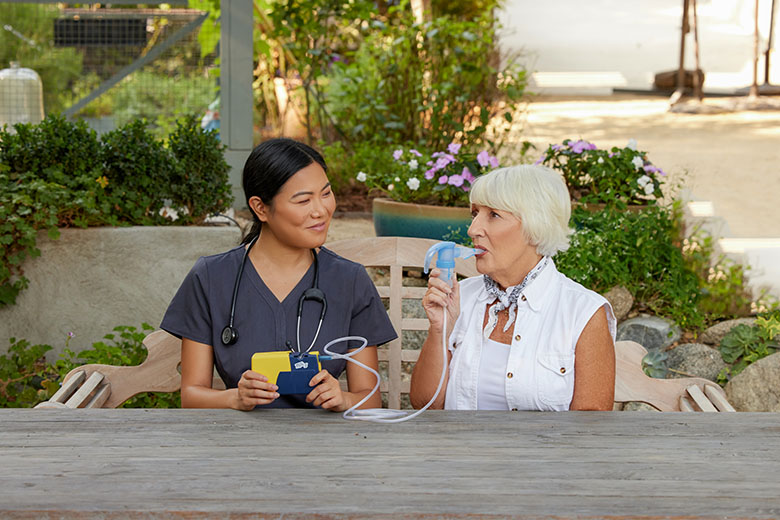Humidity
Your lungs require a great deal of moisture — 100% relative humidity — to keep their cleansing systems working, and to keep you free from infection. Your nose provides a great deal of moisture to incoming air, but in the drier air of wintertime, this can be more of a challenge. For people suffering from chronic lung problems, dry air can cause serious and lengthy respiratory infections.
To Stay Healthier During Dry Winter Months, Try These Tips:
- Drink plenty of liquids — It is recommended that you drink 6-8 glasses of water a day, unless your medical condition requires otherwise. Be sure to check with your practitioner to determine your daily water intake goal.
- Add humidity to your air with humidifying devices. Be sure to keep humidifier system clean and germ-free. Cleaning your humidifier will depend upon the type of humidification system you have; be sure to check your instructions to ensure optimum working condition.
- Cold Air. When outside, breathe through your nose — it will help warm the air you are breathing in. On cold days, wrap a scarf around your face; it will help warm the cold air before it reaches your nose. Also, when you first step outside, stop and take a few short breaths before proceeding — this may prevent coughing spells.
- Avoid Others When They Are Sick. If someone has a colds, try to avoid contact with them. Their germs are airborne. If you must be near someone who is sick, wearing a surgical face mask (available from drug stores) can reduce exposure. Be sure to avoid using their plates or utensils. Also, try to avoid crowds when possible since cold germs are typically always present in groups of people.
- Keep Your Nose Clean. Blow your nose as often as necessary. Your nose works overtime in the winter months, trapping dust and germs. It’s always a good idea to use fresh, disposable tissues so you can dispose of them afterward.
- Keep Active. Exercise is important year-round. If the weather is not conducive to exercising outside or walk around the house. If allowed by your practitioner. Try to do as much as you would if you were outdoors. Consider home exercise equipment to keep your exercise regimen going during the wintertime. Consult your prescribing practitioner before starting a new exercise program.
- Avoid Dust. The dryness of winter weather can bring a great deal of dust into your life. Follow these tips to minimize dust:
- If you have a central heating system, replace the air filters before turning your system on for the season.
- Dust frequently with a dusting agent or material that keeps the dust on the cloth. Wash or dry-clean your drapes and curtains. Vacuum or dust hidden areas, such as behind radiators. Don’t forget to change your vacuum cleaner bags and clean filters regularly.
- Keep a Healthy Weight. Maintaining a healthy weight is important to your overall wellness. Being overweight can increase the workload on your heart and other vital organs. If you are underweight it can reduce muscle mass, including reparatory muscles, which makes breathing more difficult. Consult your practitioner to determine what your goal weight should be and how often you should weigh.
- Consider a Flu Shot. It is recommended that many respiratory patients get an influenza vaccine in the fall, before the flu season begins. Ask your practitioner about getting a flu shot.
- Avoid Smoking and Stay Away from Others Smoking. Smoking is harmful to your respiratory system and will hinder your ability to breathe. Be aware that smoke from someone else’s cigarette can be irritating and as harmful to you as if you were smoking.
When to Call Your Practitioner
- We recommend calling your prescribing practitioner if you’ve noticed any of the following changes:
- Unusual increase or decrease in phlegm production
- Unusual increase in thickness or stickiness of phlegm
- Phlegm is a different color than usual or tinged with blood You feel an increase or severity of breathlessness
- You feel pain in your chest, have a fever, ankle swelling, experience extreme fatigue or unusual drowsiness
- You need more pillows in order to sleep comfortably
- There is an unaccountable increase or decrease in your weight
- You have increased fatigue and lack of energy
- You are experiencing frequent morning headaches, dizzy spells, loss of libido, or insomnia
- There is a development of confusion, disorientation, slurring of the speech, or sleepiness



